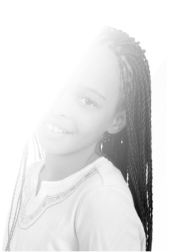I don't see hairstyles the same way I used to. Ever since my dermatologist told me I have cicatricial alopecia, I respond differently to various styles. Recently, I was watching the BET awards. Gabrielle Union looked stunning (as usual) in a one-shoulder, scarlet and silver dress paired with strappy sandals. But it wasn't her attire that held my attention--it was her hair. Gabrielle wore a braid style: two-strand twists so long they could've grazed her navel. They were as flawless as she looked. A long time ago (okay, fine, last month) I would've thought, "Yep, totally gonna rock that look this summer." But not anymore. Now I pause and wonder, "What would my fine hair and fragile hair follicles think of that style?"

Recently, I was coming home from work and saw a brown-complected girl about eight years old running without a care in the world. She, too, had braids that extended down the length of her back. A few strands were blue. She looked joyful as she swung her extensions around. Her mother also wore her hair in braids, wrapped in a majestic bun at the top of her head. Her mother suffered severely from alopecia. Around her forehead--where her hairline should've been--and from ear to ear, was nothing but bald, smooth skin, as though someone had given her a good, precise waxing.
As I watched the little girl play, my heart ached for her. Why wasn't her own hair good enough? Why couldn't she wear her natural hair in a braid style without the extensions adding extra, unnecessary weight? Even a braid style using one's own hair can be problematic if the braids are repetitively applied too tightly, I know. But I couldn't help but cringe when I thought about how young she was and all the various extensions and fun weaves that were in her future.
Cicatricial alopecia does not have to be an inevitable fact of life. And in most cases it is permanent. The hair will never grow back. Ever. As is evidenced by the mother in this story, many of us already know that. And still we continue to stress the hell out of our hair and follicles.
Why?
As I watched the little girl play, my heart ached for her. Why wasn't her own hair good enough? Why couldn't she wear her natural hair in a braid style without the extensions adding extra, unnecessary weight? Even a braid style using one's own hair can be problematic if the braids are repetitively applied too tightly, I know. But I couldn't help but cringe when I thought about how young she was and all the various extensions and fun weaves that were in her future.
Cicatricial alopecia does not have to be an inevitable fact of life. And in most cases it is permanent. The hair will never grow back. Ever. As is evidenced by the mother in this story, many of us already know that. And still we continue to stress the hell out of our hair and follicles.
Why?

 RSS Feed
RSS Feed